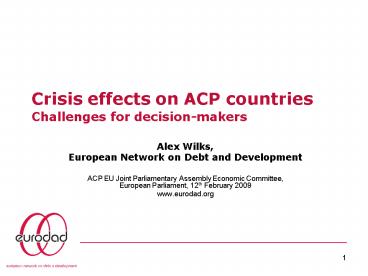Crisis effects on ACP countries Challenges for decisionmakers - PowerPoint PPT Presentation
1 / 17
Title:
Crisis effects on ACP countries Challenges for decisionmakers
Description:
3. Reduced inflows (2) 4. Financial outflows: licit. Debt service repayments from developing countries totalled US$ 540bn in 2006 ... Financial fallout ... – PowerPoint PPT presentation
Number of Views:55
Avg rating:3.0/5.0
Title: Crisis effects on ACP countries Challenges for decisionmakers
1
Crisis effects on ACP countries Challenges for
decision-makers
- Alex Wilks,
- European Network on Debt and Development
- ACP EU Joint Parliamentary Assembly Economic
Committee, European Parliament, 12th February
2009 - www.eurodad.org
2
Reduced inflows (1)
3
Reduced inflows (2)
4
Financial outflows licit
- Debt service repayments from developing countries
totalled US 540bn in 2006 - In 2006, FDI outflows from the African region
reached US8bn.
5
Financial fallout
- Share of banking assets in SSA held by foreign
banks with majority ownership, 2006 (Source ODI
EC background paper, 2009)
6
Financial outflows illicit
- In 2006 developing countries lost an estimated
858.6 billion 1.06 trillion in illicit
financial outflows. - Europe ranks second in the share of overall
illicit financial flows from developing
countries, accounting for approximately 17
percent of the total (150-180 billion per year,
or 110-140 billion).
7
Summary of developing country situation
- Weak financial position
- the IMF has identified 26 vulnerable low income
countries which have reserves which will cover no
more than three months imports. - Difficult to find replacement finance
- The IMF expects Africas (average) current
account deficit to widen by 5 per cent of GNI in
2009. In times of restricted credit it will be
difficult to find sources to refinance these
deficits.
8
EU's importance for developing countries
- The EU is the main trading partner for developing
countries. In 2007 a fifth of exports from
developing countries went to the EU. The EU is
also a major sourcing market with 28 of imports
coming from African, Caribbean and Pacific (ACP)
countries (incl. South Africa). - The EU is a major source of remittances for
developing countries. The EU27 accounted for 30
of all global remittance outflows in 2007. - The EU is a major provider of foreign direct
investment (FDI) to developing countries. Around
27 of total FDI went to developing countries in
2007. - The EU is the worlds largest provider of
official development assistance (ODA). In 2007
the EU accounted for 53 of net ODA flows
disbursed by Development Assistance Committee
(DAC) donors.
9
EU government commitments
- Millennium Development Goal 8 to develop an
open, rule-based, predictable financial system.
- Monterrey Consensus on Financing for Development.
Governments should - attach priority to avoiding abrupt economic
fluctuations that negatively affect income
distribution and resource allocation, - encourage the orderly development of capital
markets through sound banking systems and other
institutional arrangements including
transparent regulatory frameworks and effective
supervisory mechanisms.
10
Growth and poverty
- Previous growth decelerations in Africa have been
associated with increases in poverty, infant and
child mortality and out-of-school children. Worst
of all, just when economic reforms were beginning
to take effect in Africa (growth had been
sustained for ten years and accelerating over the
last three), people are being asked to tighten
their beltsfor a crisis that is not even
remotely their fault. - Shanta Devarajan, World Bank Chief Economist for
Africa
11
Long-term social effects of previous crises
- Previous financial crises have been very costly
for developing countries in financial and human
terms. - In the 5 years following the start of the 1980s
Latin American debt crisis real wages in Mexico
and many other Latin American countries
cumulatively fell by between 40 and 50 percent
and in many instances did not recover until 10 or
15 years later". - The incidence of extreme poverty in Mexico only
fell below its 1984 level 22 years after the
crisis started.
12
Safety nets and fiscal stimulus
- Safety nets are absent or weak in most developing
countries - Developing country governments cannot print or
borrow money to invest in a fiscal stimulus.
Interest rates are rising, not falling.
Pro-cyclical response risks damaging the economy
and society still more.
13
Pyschological/political effects
- Credibility has suffered. Of the
- Free market model
- Rapid globalisation
- Advice of European governments and consultants,
international financial institutions - Political reactions may differ with public
anger and instability in the EU and ACP
14
EU reactions so far
- Positive language, efforts to find new or
improved proposals. - Limited linkages between major EU financial
reform processes (de Larosiere Group etc) and
development. - Danger of misleading announcements of EU
contributions (including positive only private
flows or of aid for exports not poverty
reduction).
15
New rules Responsible Financing Charter
- Clear ex ante and ex post rules of the game only
way to enforce (and reward) responsible lending
and borrowing behaviour - Internationally recognised standards for
responsible lending and borrowing to apply to all
loans issued to sovereign states or covered by a
sovereign guarantee
16
Recommendations
- The EU can and must honour international
commitments and produce a strong global element
to its financial crisis response. - This must assist developing countries maintain
social spending and counter economic recession.
Through maintaining inflows (aid) and plugging
outflow gaps (debt cancellation, regulation
against capital flight measures on tax havens,
TNCs). - The EU must also commit fully to rebalancing
international economic governance mechanism,
including the governance and roles of the World
Bank, IMF and other institutions.
17
More information































